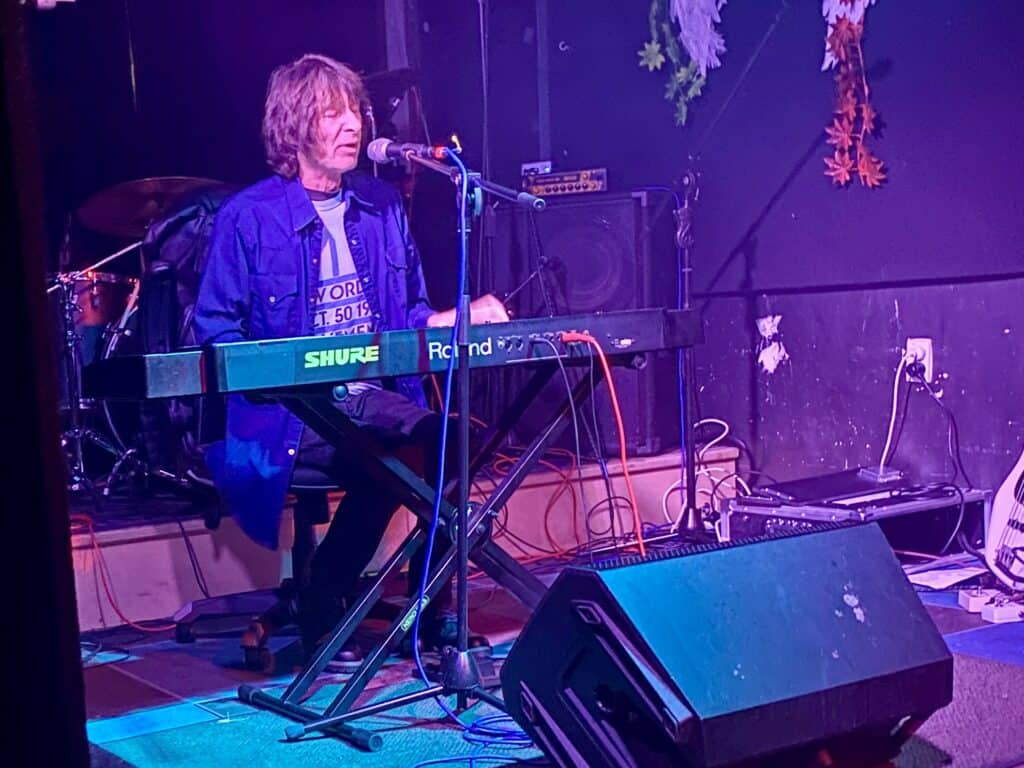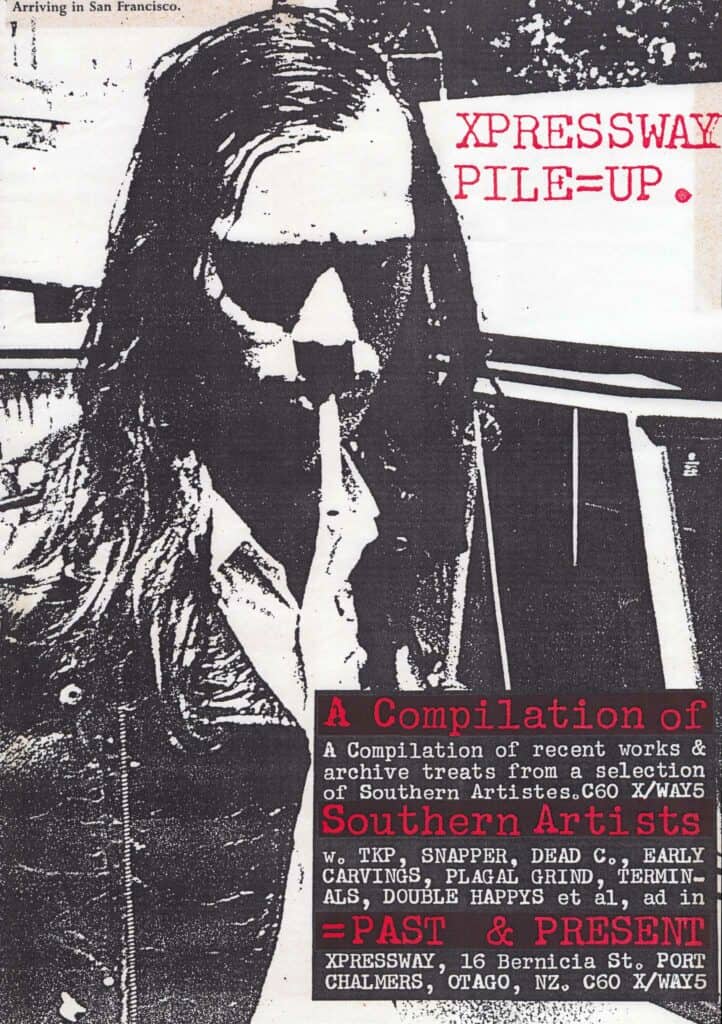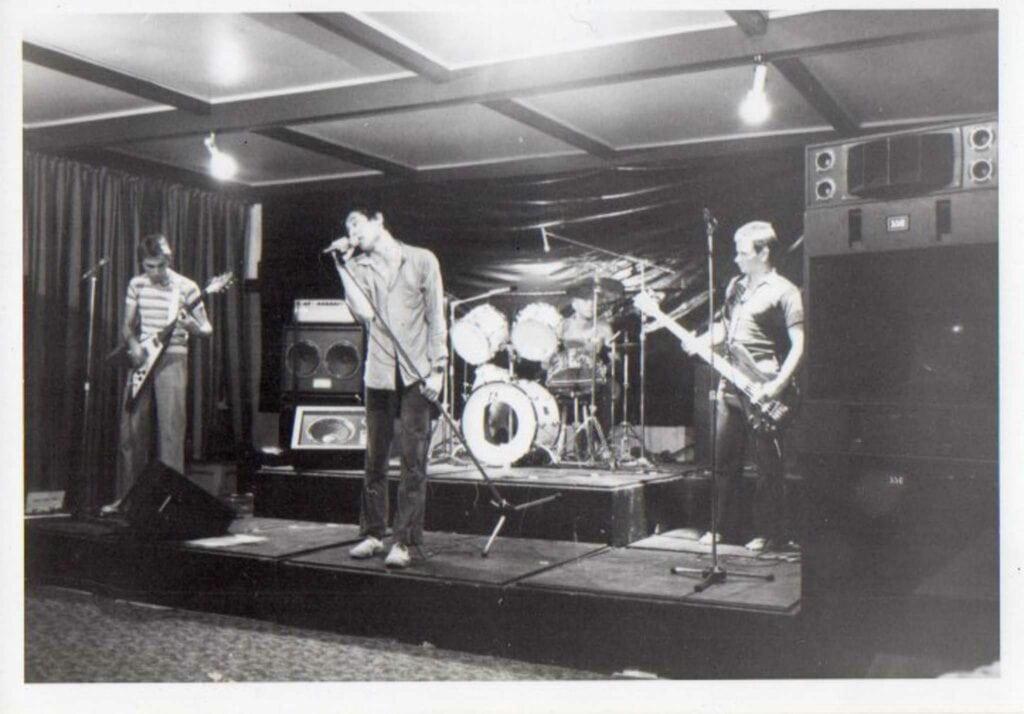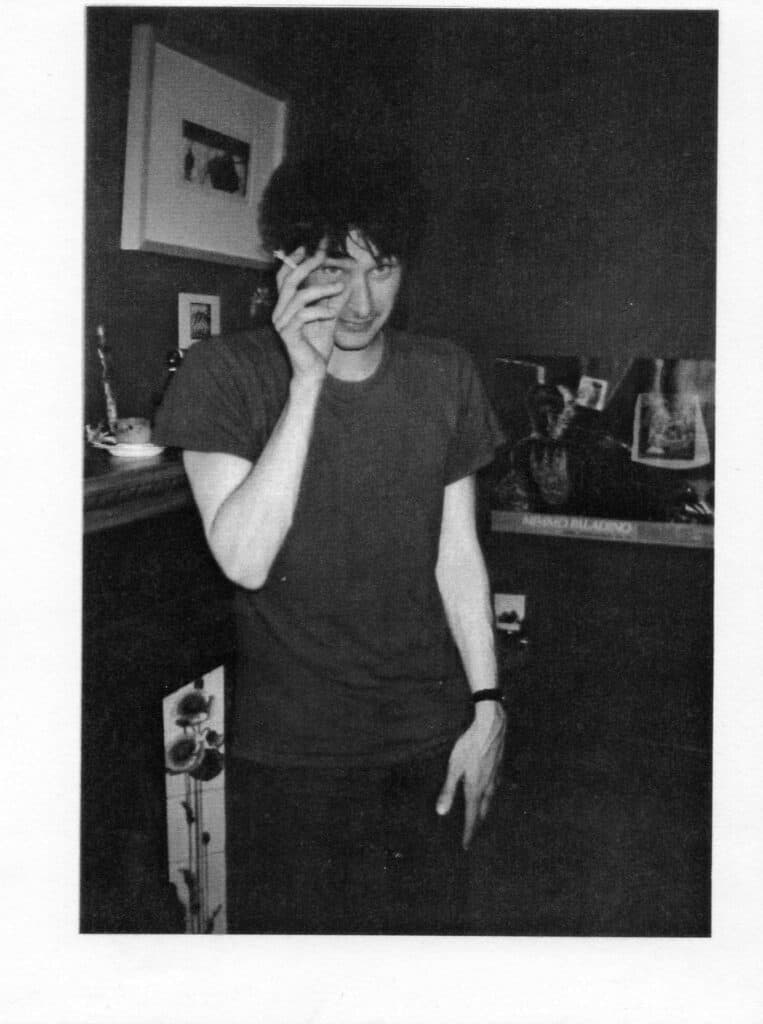
Peter Jefferies life in music is the subject of a new biography, The Other Side of Reason, by post-punk historian and writer Andrew Schmidt. It was a book nearly a decade in the making for the pair who were both from small towns – Stratford and Paeroa – which gave them some common ground from the outset. Peter Jefferies spoke to Richard Langston.
Richard: Andrew describes you both as creative country boys from small North Island service towns who found a life in music and art that allowed you to step outside of yourselves…
Peter: Yeah, some of Andrew’s observations have been really interesting for me to read. It sounds weird to say it but in a way Andrew knows more about me that I do. It’s so accurately drawn that I’m interested in it, that’s why I’m glad it’s a biography cos the things I read most are biographies about musicians or artists or actors, basicially people who do creative shit. I like them more than autobiographies because there’s an overview. You’ve got to be really lucky for someone to be that interested in you, and also to have a good enough knowledge of what you do. Andrew’s got that. He wrote a big piece about me for AudioCulture. I love that he’s written the broader picture of the times, and all the stuff that is happening around me.

How did the idea of the book come about?
Mike Wolf from the De Stijl label in the USA had written a blurb to go with Last Great Challenge when they issued it (in 2013) and he said in that no one had written a book about me, and Andrew and I were joking about on Facebook or something, and he made some comment and I said well if you want a book about it, why don’t you write one, and he gets back to me about 10 minutes later and says all right I will. From that point on he took it seriously. The point at which I realised he was the right guy to write the book was when he said Closed Circuit was my best album. Only me and my mum thought that and I don’t think anyone else in the entire world thought that. That’s the best one, and if you want my trilogy it’s that and Electricity and Last Great Challenge.
Andrew’s a thorough researcher and he paints the picture of you growing up in Stratford, and there at primary school with you is Ross Hollands, later of Bird Nest Roys, and a fellow traveller that you meet very early on…
Yes, and I’m still friends with Ross now.
I love the fact that here you are in this small town and one of the first records you buy is the Velvet Underground’s White Light White heat for 99 cents at the Farmers Co-op…
Yeah, absolutely brilliant. They had those stand-up racks that revolve and you can stuff five or six records in each rack and they twirl round. We were in the agriculture section heading towards the bedding section and there was one of those racks and I went and had a look and there was this Velvet Underground record with blobby writing and loud colours, bright purple writing and the Coke bottle mouth on it. I thought it was a compilation; it took a while for me to realise what it was.
Then you were brave enough to put it on at parties…
Yeah (laughs). As it says in the book, you might get through side one if you put it on at the right time. I’d hardly ever make my favourite moment, the second guitar break on “I Heard Her Call My Name’ cos it was normally taken off by the first one y’know. People are saying put on ‘Dreams’ By Fleetwood Mac (laughs).
And your last act at Stratford High School is to play a cover of the Sex Pistols’ ‘God Save The Queen’ in the school band…
I only went back to school for my last year because my art teacher, Roger Taberner, was so cool. That year changed me life; he literally taught me how to think. I learned how to make something from nothing, and once you could do it it didn’t matter whether it was music or art or whatever. He knew I was going to pass, not because I was a good artist, but because my ideas were good and I could explain them, I could say why that bunch of photos I’d taken meant something or why that picture of a tap dripping that I’d just drawn had some relevance. At the end of year assembly the headmaster is saying we like to think ahead at Stratford High and I’m thinking what a load of bollocks, you’ve given me nothing but grief over taking art. When the band got up to play they thought we were going to do something from Joseph and the Amazing Technicolour Dreamcoat, that sort of dribble. They didn’t even bother to ask what we were going to play (laughs). We played ‘God Save the Queen’ and it caused mayhem. The kids just went off, the kids are up in their seats pumping the air; the parents were up in the aisles outraged, seriously music could still affect people that much in those days. One of the singers got down to his undies. The deputy principal was purple with rage. That’s how I left school, brilliant (laughs).
Sometimes things could turn nasty, and you nearly got your beans when you played the Lion Tavern in New Plymouth with one of your first bands, Pink Noise…
There were some people the new owner didn’t want in his bar and he wanted us to tell them. Any time there was a difficult job in that band, it was always handed to me. Gordon Rutherford handled the job when the brakes went out on the truck but apart from that, it was always my fucking job. This one guy had just got out of prison and he’d been in as accessory to murder, a serious guy. I had to tell him and his mates the owner wanted them out of the bar, and he said, ‘I’m going to do you’, and he would’ve. I thought he was going to bottle me, but I was lucky he was someone who listened when I met him later. He gave me a chance to explain what had happened, and I told him the owner said you guys are always causing a problem and it was my job to tell you. If you want to thump me go ahead but I’m just the guy who gets stuck with those sorts of jobs all the time. My brother Graeme got the guitar safely out and he’s across the road!

The book outlines how important certain places become to you and one of the first is Dunedin…I know you went to Auckland to art school but you seem to be in sympatico with Dunedin…
I wouldn’t say I ever felt at home in Auckland, I liked it and it was exciting and I met plenty of good people and I had good friends to flat with, Graeme, Brett Jones, Johnny Pierce and Chris Matthews and Andrew Frengley, and Nocturnal Projections did some great shows in Auckland. People like Paul Rose really helped us. In Dunedin I did feel at home; I was part of a community and had a home base. I never thought I’d leave.
One of the real strengths of the book is that it details the Xpressway story …how it happened and how it worked…
Xpressway was an amazing thing to do and yet I almost didn’t realise how amazing it was until it was a damn near over. Starting a cassette label when you’ve been used to making records didn’t seem like it was going to be that big a deal when Bruce Russell first suggested it. But the compilation Pile-Up that was a real door-opener. We couldn’t have made that without each other, Bruce was the public face of us and the networker and and he was brilliant at it, he learnt the lingo really quick.
Xpressway connected you to this international network of like-minded labels and muscians…
Incredible wasn’t it. Pile-Up got us to Europe, and the stuff before that was already getting noticed by magazines like Forced Exposure, and Tim Adams from the Ajax label was making the Dead C releases, This Kind of Punishment, Wreck Small Speakers and Alastair Galbraith. It’s really interesting to see where the Dead C arrived at, I knew Bruce before he was in the band and Michael Morley was in Wreck Small Speakers, and Alastair was in The Rip. Bruce didn’t really have that much ability with technical equipment at that point, that’s what he needed me for to master and do all this stuff. It was already lo-fi so you needed every little bit extra you could drag out of this stuff. It was all going onto a cassette which would blunt it down again. I had a nice McLaren EQer. Peter Gutteridge had the master of Pure and he would put it through my stuff and had it come out the other end.
I understand there was a stack of four cassette machines to make copies of the tapes…
During the day Bruce would be at work and I’d run the copiers, every half hour you’d go in and turn them over.
The Xpressway activity leads to you and Alastair Galbraith and Sandra Bell going to the States for the first time in 1993..you met the writers and label people who’re so enthused by the music….
It was surreal, I’d never been out of the country. This was my introduction to the big wide world, and you can see what a geek I am in the Head in The Clouds documentary that was made about that tour. What a dork! But through all my amazement I still managed to play good shows that make me look like I know what’s going on. We were babes in the woods; there’s America going by at 90 miles an hour and we’re going 30 miles an hour trying to catch up. But we weren’t behind with our sound, they were catching up to us. We were ahead of the game, and I reckon perception of New Zealand music changed. It was the Xpressway and Flying Nun bands who changed it. The only people I reckon from the mainstream who did it were Neil Finn and Don McGlashan cos he went out and did it.

Music has given you great highs and lows, but you couldn’t have taken any other course in life could you?
I was gonna take art until art school fucked it up for me and put me off completely. I was a bit like Syd Barrett. Andrew says I keep comparing myself to Syd. Do I? Maybe I do cos I have all these weird similiarities, he was the same, he wanted to be a painter and ended up doing music. I don’t know if I’ve got the right personality to be a musician in some ways. I ended up fronting a band but I was a Karen Carpenter type; I wanted to hide behind the drums. I didn’t want to front a band, but I had to. I would much rather have been a painter, that’s why I’m enjoying not playing live much and don’t have to be a teacher and I don’t have to run to anybody’s schedule. The first time that’s been the case since I was 17. I’m Mister Lazy now.
One thing that surprised me in the book was that when you lived in Canada in 1997 for a brief period you spent six weeks on the streets in Vancouver…
Yeah, that sucked. I didn’t really know my way around downtown Vancouver that well ; I knew my little part of it, and I didn’t really have the means to sort it out and to stay alive. We went to the Air New Zealand office and they got me home; I’ve always been grateful to the national airline for that.
There were some moments that made me laugh; when you and your mother bet on a horse and it financed the release of a record…a particularly New Zealand moment!
Yes, the Catapult/Fate of the Human Carbine single. My mother Gwen was really good at tactical betting. She had this one horse Sharzamarni she’d taken with the entire field. Sharzamarni won and this other horse, a 96 to 1 outsider, came in second. We got the quinella and it paid $420 and we had $2’s worth, and we had Sharzamarni for a win and it was paying about $8. We might have also had it for a place. We won close to a thousand dollars.
The book also shows how your mother was central to you life…
Absolutely. All the way through. And some people can go ‘oh, you’re a mumma’s boy’, well bugger off! She had an on-going connection with us. We could always lean on her, when our health fucked-out it was back to mum’s, girlfriend went overseas it was back to mum’s, and she sent me $500 to get home when I was on the streets in Vancouver. Not only that she listened to the freakin’ albums and had an opinion about them.
You also took magic mushrooms with her!
Yeah, Gwen had her wild period from her late forties into her early fifties when she started to take some illicit substances. She’d had to dampen it down all the time being married, and then bringing up kids. She’d had to play it straight for so long and she wanted some fun for a change.
I know there was a long period when you gave music away, but you seem to be active again…are you still writing and recording?
My partner Victoria and I are meant to be finishing an album which has been on the go for three years, and there’s a single that I’m doing with a guy called Joey Worton but he’s hurt his hand and can’t play guitar. He’s from Manchester and mates with Peter Hook and all that. That single’s sort of in limbo. The album will go to Grapefruit label if they like it, certainly they get first dibs on it cos they did the album Closed Curcuit. We’ve had to write 17 or 18 songs to get 11 that we think are good enough and even then Victoria wants to do things to one of them. We will get it done. To follow up Closed Circuit it better be good or we better not put it out.